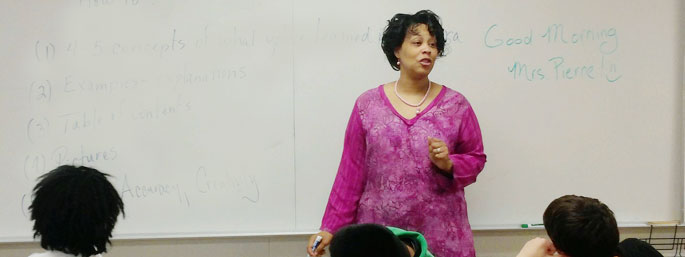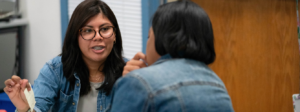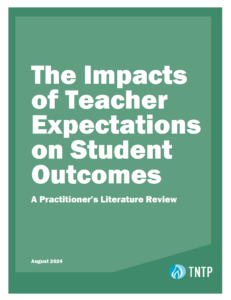The first day I observed Mrs. Pierre’s math class at H.L. Harshman Magnet Middle School in Indianapolis Public Schools, I left wishing she’d been my math teacher. Perhaps then I might have enjoyed learning math—like all the students in her classroom do.
Mrs. Pierre isn’t the typical teacher I’d worked with as a coach; in fact, before meeting Mrs. Pierre, I’d coached mostly new teachers—because new teachers are, for the most part, the teachers who get coaching opportunities. Mrs. Pierre, on the other hand, has been in the classroom for 10 years, and she was already highly effective. Just recently, she was awarded the Hubbard Life-Changing Teacher Award, a $25,000 prize. But for two years, we’ve been working with the leadership team at Harshman to build a coaching model in which all teachers, regardless of performance or experience level, receive coaching. That’s how I arrived in Mrs. Pierre’s classroom.
Mrs. Pierre takes a tough-love approach to teaching. She gives her students “an opportunity to struggle” through challenging content, but she cheers them on at the same time. (“You’ve got it, girl!” “You are going to feel SO good when you solve this monster problem!”) During independent work time in her classroom one day, I stopped at one student’s desk. She looked stuck, and I offered some help. “No, I’m okay,” she told me. “I’m on the struggle bus and I’m working to nail this.” I saw the same tenacity from many of her peers—a clear sign that struggle is one of the main ingredients to Mrs. Pierre’s outstanding student outcomes. (And they are outstanding: For the past two years, every single one of Mrs. Pierre’s eighth grade algebra students has passed the state end-of-year test—a test most students take as sophomores in high school.)
Despite her obvious mastery in many areas, Mrs. Pierre also believed she had room for growth. But she wasn’t initially open to being coached—after all, I was an “outside” coach, I wasn’t a math teacher and she wasn’t a fan of change. Plus, she was already doing great work. So I sat down with Mrs. Pierre to ask her about her experience of being coached, and what we can do to make coaching work at all levels.
You’ve shared with me that you were skeptical of coaching in the past. Why?
I think my initial resistance was due to feeling overloaded already. Teachers can feel very stressed, and the idea of having someone come and possibly change things that you feel already work was just overwhelming.
So how has your view changed?
I believe that every teacher can grow, no matter how excellent they are. There's always something to learn. I have a different outlook now, due to finding that I can grow with the right help. I'm reluctant to somebody coming in to tell me what to do. But if you can build a relationship with me, you can take me to the mountain.
How would you describe our coaching relationship?
I remember your first words after you sat in one of my classes. You said, “You have so much joy factor in your class. If I had had a math teacher like you, I would have enjoyed math more.” And I'll never forget this. Your next question was, “What can I do for you?” You didn't come telling me, “I think you need to try this.” You asked me what I needed.
What's one area of your teaching practice that you think has improved with coaching?
At one time, I felt like as long as I had a special education teacher in my classroom, that was all my special education students needed. But now more than ever, I'm prepared to meet the needs of those students myself.
So given that you feel you’ve grown in this way—do you think coaching can benefit new teachers and veteran teachers?
I think coaching can be beneficial to all teachers, but I really think there should be a different approach to coaching veterans. Most veteran teachers have established classroom management skills and know how to interact with students and how to build relationships. New teachers have to learn how to build those relationships, so they may need coaching in those skills.
But when you talk about strategies for meeting the needs of all students, I think all teachers are able to benefit from coaching in those areas.
How should we approach coaching veterans and novices differently?
With a veteran teacher, I think they have to feel like what they do is considered. A coach could just come and observe their classroom. Maybe for two or three visits, the coach doesn’t say anything other than, “I really enjoy being here.” Then they have a way in to say, “You know, one day I came to see you and I saw this. What do you think about this?” This might sound absurd—but let it be the teacher’s idea.
It's like what we do with students—the “think ratio.” I'm hearing you say that the think ratio looks different for veteran teachers and new teachers. Is that right?
That is exactly right. A new teacher needs to build their strategies, versus a veteran teacher who knows hundreds of strategies that she's already tried but may not be successfully or consistently using them.
Do you have any questions for me, as your coach?
I’m curious—have you learned anything from working with me?
One thing I've taken away from you is that we have to be mindful of the strengths and deficits that we all have—whether it's me working with teachers or a teacher working with students. I don't know that I was in tune with that early on, when I started coaching. So thank you.








